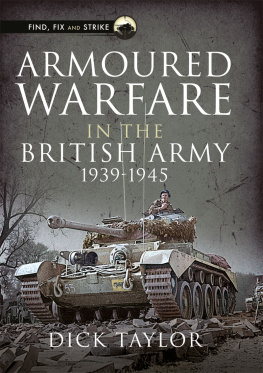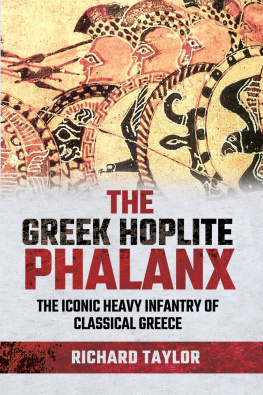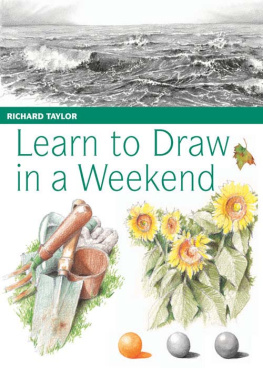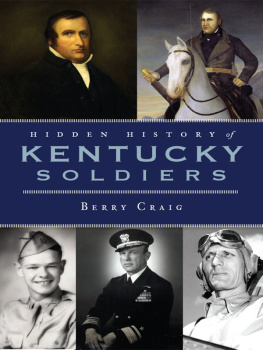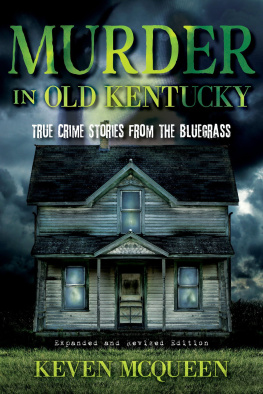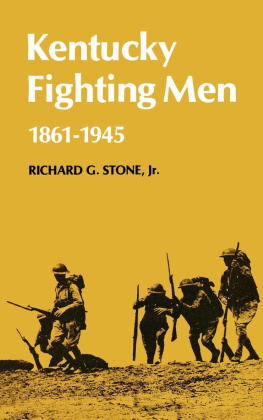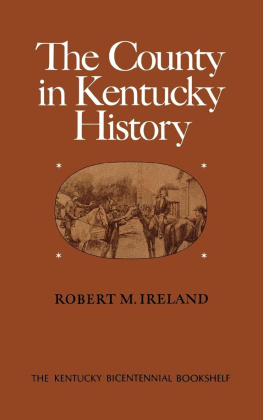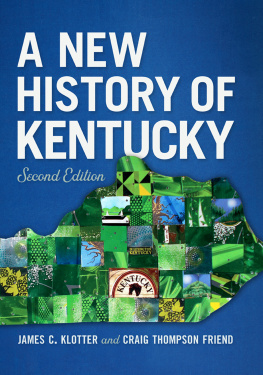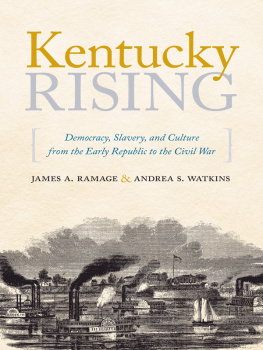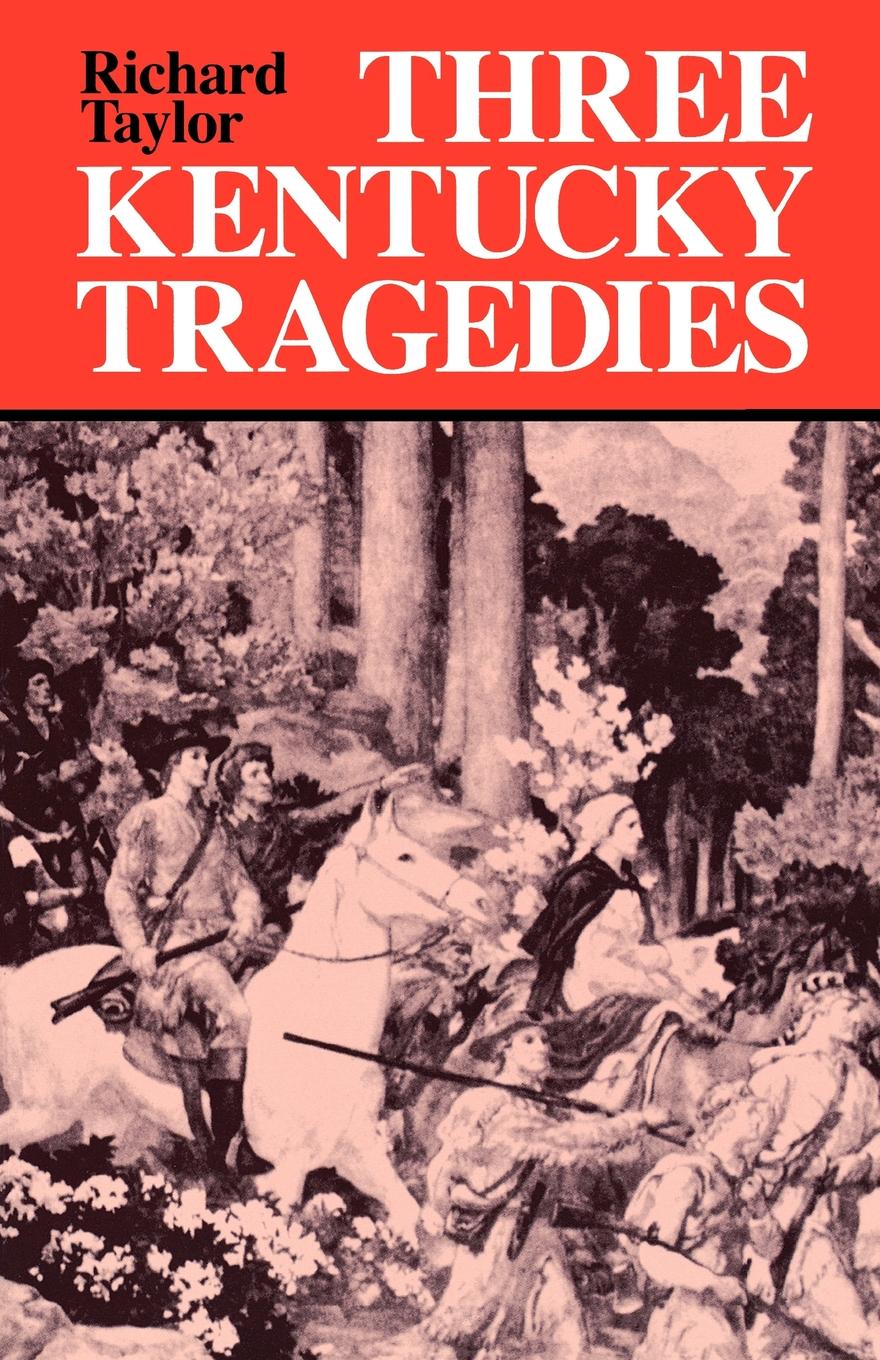NEW BOOKS FOR NEW READERS
Phyllis MacAdam, General Editor
Three Kentucky Tragedies
Richard Taylor
THE UNIVERSITY PRESS OF KENTUCKY
Cover illustration: From a mural by Ezra Winter at the Clark National Memorial in Vincennes, Indiana. Courtesy of the George Rogers Clark National Historical Park.
Copyright 1991 by The University Press of Kentucky Scholarly publisher for the Commonwealth, serving Bellarmine University, Berea College, Centre College of Kentucky, Eastern Kentucky University, The Filson Historical Society, Georgetown College, Kentucky Historical Society, Kentucky State University, Morehead State University, Murray State University, Northern Kentucky University, Transylvania University, University of Kentucky, University of Louisville, and Western Kentucky University.
01 00 99 98 97 96 7 6 5 4
Editorial and Sales Offices: The University Press of Kentucky
663 South Limestone Street, Lexington, Kentucky 40508-4008
Library of Congress Cataloging-in-Publication Data
Taylor, Richard, 1941
Three Kentucky tragedies / Richard Taylor
p. cm.(New books for new readers)
ISBN 0-8131-0907-8 (acid-free)
1. Readers for new literates. 2. ReadersKentucky. 3. Kentucky
History. I. Title. II. Series.
PE1126.A4T39 1991
428.6dc20
91-29438
This book is printed on acid-free recycled paper meeting the requirements of the American National Standard for Permanence of Paper for Printed Library Materials.

Printed in the United States of America
Contents
Foreword
The New Books for New Readers project was made possible through funding from the National Endowment for the Humanities, the Kentucky Humanities Council, the Scripps-Howard Foundation through The Kentucky Post, and Financial Women International. The co-sponsorship and continuing assistance of the Kentucky Department for Libraries and Archives and the Kentucky Literacy Commission have been essential to our undertaking. We are also grateful for the advice and support provided to us by the University Press of Kentucky. All these agencies share our commitment to the important role that reading books should play in the lives of the people of our state, and their belief in this project has made it possible.
The Kentucky Humanities Council sees the campaign for adult literacy as closely linked to our own mission, to make the rich heritage of the humanities accessible to all Kentuckians. Because the printed word is a vital source of this heritage, we believe that books about our states history and culture written for adult literacy students can help us bring the humanities to Kentucky citizens who might not otherwise have the opportunities to participate in our programs. We offer these books in the hope that, in content and by example, they will be of value to adult new readers.
Virginia G. Smith, Executive Director
Kentucky Humanities Council
Preface
The three stories that follow are based on the early years of Kentuckys rich and colorful history. Each is a tragedy in one or more senses. Tragedy, in a literary sense, is about a downfall that results from human failing. The failing may be some flaw in character or the breaking of a moral law. Fate may add to a fall. Because the tragedies of others are about human failing, these tragedies are, in a sense, our own. Tragedy may also be seen in a broader sense as disaster, some unhappy event that causes dread or fear.
As these stories show, the meanings of tragedy are often combined. The first is a tale of love and revenge with a twist. The second is about the fall of a family and the brutal murder of a slave. The last tells of a disastrous battle between Indians and settlers at the end of the American Revolution. In each I tried to follow the historical facts as they are known, but I have added conversation and details in order to be true to the spirit of the events. It has been said that, when telling a story, you should never let the facts get in the way of the truth.
About the Author: Richard Taylor is the author of one novel, Girty, two books of poems, Bluegrass and Earth Bones, and a forthcoming book on Sue Mundy, a Confederate guerrilla active in Kentucky during the Civil War. Taylor teaches English at Kentucky State University and lives with his wife and three children outside of Frankfort, where he owns Poor Richards Books.
Acknowledgments
This book has been produced with help from many people. Special thanks are due Lillian Nunnelly, director of adult learning in Franklin County, and the new adult readers and their tutors at the Thorn Hill Learning Center, whose insights and enthusiasm made each reading session a learning experience for all of us: J.R. Ross, Antoinette Herzel, Mary Heilman, Chris Brown, Charles Chuck Miller, Lois Jean True, Harold Purvis, James Warren, Ann Carter, and Becky Van Leuven.
Thanks are also due to Phyllis MacAdam, whose support and good advice during every phase of the project were invaluable. Additional thanks to Boynton Merrill, Jr., whose Jeffersons Nephews, one of the finest pieces of historical writing about Kentucky that I know, forms the basis of the Lewis narrative. Finally I want to thank Nancy Brooks and Barbara Sharp at Kentucky State University who generously and patiently helped prepare the finished text.
The Beauchamp-Sharp Tragedy
Jeroboam Beauchamp kissed his wife Ann good-bye, saying he would be home in a few days. He climbed onto his horse and set out for Frankfort to kill Solomon Sharp. The time was early November of 1825. He left the Green River country of Western Kentucky and rode northeast toward the state capital. There he knew he would find Solomon Sharp, the man he must kill. When he came to the main road, he put a red bandanna over his head to hide his face.
Jeroboam and his wife lived on a farm in Simpson County. The trip to Frankfort would take four days. On the way he thought about his promise to his wife. Ann had agreed to marry him only if he would kill Colonel Solomon P. Sharp.
Solomon Sharp was a lawyer and politician. As a young man, he was elected to the Kentucky legislature. Then he served in the U.S. Congress. In 1818 he married Miss Eliza Scott of Frankfort. They bought a home in Bowling Green, Kentucky, and started a family. He opened a law office there. But three years later he ran for a seat in the State Senate. He won the election and moved to Frankfort.
Jeroboam was also a lawyer. Born in 1802, he was the second son of Thomas Beauchamp, a small farmer. He grew up in Simpson County, six miles south of the town of Franklin. He went to local schools and later taught school himself. When he tired of teaching, he moved to nearby Glasgow and studied law. He met Solomon Sharp, who hired him to do some legal work. But Jeroboam did not stay long with the law. Young and restless, he moved back to his fathers farm in 1820.
There he met Miss Ann Cook. She had been raised in Virginia with every advantage. She was well educated. She wrote poetry. Unlike many women of her day, she was raised to think for herself. Lively and popular, she went to many parties. Then her family lost its property, and her father died. She and her aging mother moved to Kentucky. They came to live with her brother, who owned a small farm near the Beauchamps.
That same year Solomon Sharp was asked to serve as Attorney General of Kentucky. He had a political enemy named John Waring who wanted to put an end to Sharps political career. Waring printed a handbill accusing Sharp of having an affair with Ann Cook. He was also accused of being the father of Ann Cooks illegitimate child. The baby had been born dead.


